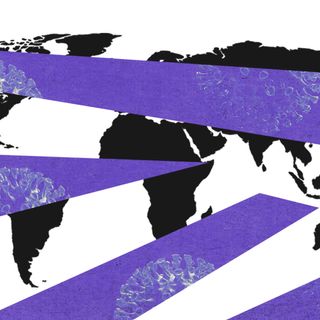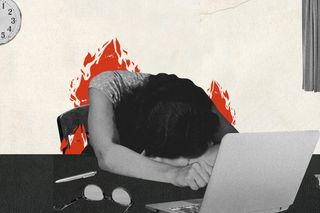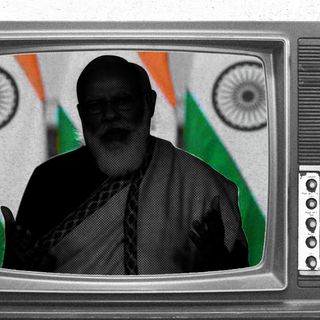
Why Second‑Wave WFH Burnout Feels So Different From Regular Work Stress
Right now, our bodies are processing more than just stress — there’s grief, helplessness, anger, and many other emotions we’re experiencing simultaneously.

Wake up, log in to work, read new details about the appalling state of the country, do chores, watch the healthcare system collapse in real time, look for vaccine slots — this is the work-from-home rut many urban Indians are caught in during the second wave. And even though they have been working from home since March 2020, 2021 somehow seems more difficult.
Working from home was very different in 2020 “because it had a certain ‘novelty factor,’” explains Samriti Makkar Midha, a Bombay-based psychotherapist. It gave people a chance to bake, paint, read — activities their busy lives had never given them a chance to indulge in before.
“In fact, it felt like some kind of divine intervention at times that owing to the virus, we got to rest. But this year, it’s like a demon with superpowers pushing us closer to death,” says Jalasmi, 25, who works in media and communication. She hasn’t had even a single day off in the past 15 months.
When the pandemic struck last year, forcing us to retreat into our homes, nobody had anticipated it would last this long, Midha explains. Now, with the realization that the pandemic may drag on indefinitely, it feels disheartening and demotivating to go on with the WFH routine that had seemed like a short-term measure in 2020.
The prolonged trauma of living through what some are describing as an “apocalypse,” has also made working significantly more difficult in 2021. “When trauma strikes the first time, you innately have higher tolerance because we are born with resilience. Because we do not know the extent of it, there is also hope… But when it persists, and there is no respite in sight, the fear turns to phobia,” Arushi Sethi, who runs an organization for mental healthcare in Mumbai, explained.
And this phobia translates into round-the-clock anxiety impacting all areas of our lives, including work. This fear also seems more real this year since the pandemic has hit a lot closer to home — almost everyone knows at least one person who succumbed to the virus during the ongoing second wave. “It’s really scary witnessing people request for ventilators and ICU beds for 20-year-olds and hearing of young friends, cousins, and colleagues succumbing to the virus. I’m trying to be as healthy and socially-distanced as possible, but the fear has been multiplying day-by-day, and it has now affected my sleep too,” Jalasmi adds.
Related on The Swaddle:
Scheduling Our Quarantine Days Like We’re Superhuman Is Counterproductive
A greater sense of helplessness and powerlessness has also seeped in during the second wave, especially with news of the overburdened healthcare system forced to turn patients away, which is making pandemic anxiety worse, Midha notes. Given that one can get the infection even without stepping out, people have no idea how to protect themselves or their loved ones, or to afford them healthcare, if the need arises — and this lack of control is only serving to exacerbate the people’s anxiety.
And right now, there is simply no way to take a break from reality, Midha explains. Things that help people de-stress — like, stepping out for fresh air, going out for a quick swim, or simply catching up with friends for a drink — haven’t been viable options for more than a year now. In 2020, when work was stressful, people could either talk to friends or family to unwind, or just mindlessly through social media for a few minutes to distract themselves. Right now, neither social media, nor people’s WhatsApp inboxes are providing any respite — in fact, they serve as stark reminders of the same distressful reality. And since everyone is struggling to cope with the same reality, even conversations with friends heighten and reinforce people’s anxieties, rather than acting as a distraction, Midha states.
“My friends and family are advising me to take a break, but where do I go taking a break from here? The offline realm is equally terrible, equally heartbreaking,” says Jyotsna, 24, a journalist, who’s also trying to verify resources for people like many other youngsters.
While Jalasmi, and many like her, are finding it difficult to even get themselves out of bed every morning and face the reality the country is currently caught in, others are living in a perpetual state of fatigue. It’s a result of the emotional turbulence people are undergoing, manifesting physiologically. As a result of being hypervigilant all the time, people are reaching their fight-or-flight mode at the slightest triggers, Midha noted. When people are constantly worried and on their toes and can neither relax nor take a break to regulate their stress levels, fatigue is a natural consequence. This is aggravated by the fact that sleeplessness, too, has become a common feature of living through the pandemic. For many, survivor’s guilt makes it even worse.
“There is a guilt that I could survive this and the other person could not,” Manvi Sharma, a counseling psychologist, had told The Swaddle. Since “emotions are not linear or unitary,” while the guilt may be tenuous on some days, it can easily overwhelm a person on others, she added.
This survivor’s guilt can prevent people from asking their employers to accommodate their mental health needs — simply because they feel undeserving of consideration. “I feel ashamed about my fatigue, which I tell myself I don’t deserve. But I am fatigued. I’m tempted to call my editor and ask for a leave — again, something my privilege affords me unlike most of this country’s people,” Dhvani Solani, a journalist, wrote in Vice India.
Related on The Swaddle:
Zoom Fatigue Is Why Working From Home Feels So Difficult
Moreover, in addition to stress and anxiety, people are also “dealing with a sense of loss and grief almost on an everyday basis — and that is translating into anger and demotivation, besides inducing a state of depression — not necessarily clinical,” says Midha. Unlike last year, when social media was flooded with pictures of people pursuing new hobbies, picking up new skills, or simply spending more time with family — in 2021, social media is overflowing with posts of people’s desperation and anger at the administration. “There’s also anticipated grief — like, what if I, or my family and friends, don’t make it?” she explains, adding this gamut of emotions and the constant barrage of thoughts are leaving people completely sapped, burning them out.
While some people claimed WFH made them more productive towards the end of last year, many people are now complaining of loss of interest in work, and not being able to focus on tasks at hand, Midha notes. But the problem isn’t the work itself for most people. It lies in the fact they are working through an unprecedented, emotionally draining global crisis, which is leading them to reevaluate their values, goals, and question the way they’re used to functioning — resulting in an existential crisis. “I think the biggest lesson I’ve learnt through this pandemic is that work is just a part of life, and not our whole lives,” Jalasmi says.
And so, a feeling of pointlessness has set in with respect to their work, making it seem absurd to stick with usual work routines when nothing is usual around us anymore. “Everything I do seems so futile right now,” Prakrati, a 25-year-old with a corporate job, says.
Devrupa Rakshit is an Associate Editor at The Swaddle. She is a lawyer by education, a poet by accident, a painter by shaukh, and autistic by birth. You can find her on Instagram @devruparakshit.
Related


The Govt Celebrating “Power of Positivity” Is An Example of What Toxic Positivity Looks Like
